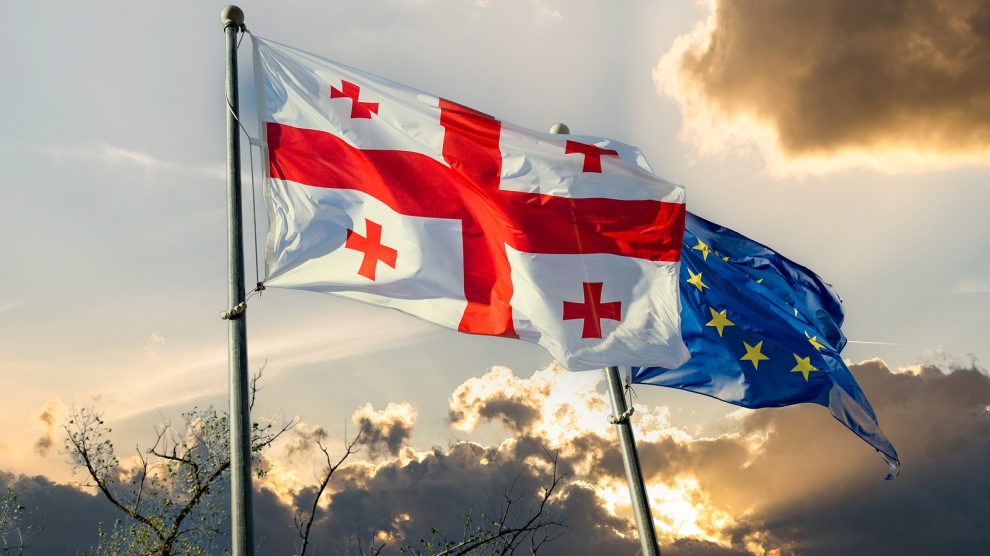The European Union must take steps which hold Georgia’s government accountable without undermining the European aspirations and faith of the Georgian people.
In June, EU leaders paused Georgia’s accession process over concerns about democratic backsliding, particularly after the country passed a Russian-style ‘foreign influence’ law.
The EU took this step to signal its disapproval of Georgia’s move toward a more Russian approach to governance. But there’s a twist: while the decision was meant to steer Georgia away from Russia, it could have the opposite effect.
- Georgia’s freedom fighters have one last chance to fight authoritarianism—but they need ECHR support
- Salome Zourabichvili: A steadfast leader in turbulent times
- ‘Grey operations’: Georgia’s security challenge
With Georgia now more isolated, this move could strengthen undemocratic rivals like Russia, boosting their influence in the country. At the same time, it risks undermining the Georgian people’s European aspirations by sending the wrong signals. The EU must clarify its position by reversing the suspension of the accession process to remove this awful cloud of uncertainty from the Georgian people. At the same time, it should take strong actions against the government’s illiberal actions.
The EU might hope its recent rebukes could stir dissatisfaction among Georgians, who see their government as increasingly aligned with Russia, eventually fomenting political change.
It’s a high-stakes gamble. The EU is now waiting for the upcoming parliamentary elections (set to take place on October 26), betting on the Georgian people’s strong desire to move closer to the West overcoming the government’s dubious election tactics.
But the harsh reality is that by doing little to support democracy in Georgia, and suspending negotiations, the EU’s actions, or lack thereof, might end up worse than doing nothing at all.
‘Join us instead’
The EU finds itself in a tricky spot, trying to uphold the democratic standards required for membership without driving a wedge between itself and Georgia. While public support for the EU is strong in Georgia, it doesn’t necessarily translate to a deep commitment to democracy.
For many, the draw is economic opportunity rather than democratic values. This makes it uncertain whether the EU’s actions will inspire enough Georgians to overpower the current government’s authoritarian agenda.
Another pressing issue is the risk that the 85 per cent of Georgian citizens who want to join the EU might feel abandoned by it. Massive and bloody public protests against the new ‘foreign influence’ law failed to prevent its implementation, which EU leaders view as a setback from the standards set for candidate status.
Still, the protests were significant, but the EU’s support for the Georgian people remains insufficient, leaving many feeling disillusioned and unsupported.
The EU ambassador in Georgia recently revealed Brussels was considering suspending visa-free travel for Georgian citizens in the Schengen zone. This move is yet another example of the EU sending mixed signals to a population which overwhelmingly wants closer ties with Europe.
Essentially, the EU is saying: “We’ll let you become angry enough to fight your own government, but don’t expect our support.” Meanwhile, this approach risks pushing Georgians toward Russia, where propaganda could easily spin the narrative: “The EU doesn’t want you, join us instead.”
A different approach
The US has taken a different approach in its dealings with Georgia. In June, the State Department imposed visa sanctions on 20-30 government officials, including members of the ruling Georgian Dream party, lawmakers, law enforcement officers, and their families.
This followed last year’s sanctions on Georgian judges for “significant corrupt activities”, banning them from entering the US. These actions make it clear to Georgian citizens that the problem lies with their government, not the country itself. This approach encourages democratic efforts for change, in contrast to the EU’s suspension of accession, which hasn’t had the same impact.
The European Union must take steps which hold Georgia’s government accountable without undermining the European aspirations and faith of the Georgian people. It’s crucial for the EU to make its stance clear, showing disapproval of the government’s actions while still supporting the citizens who look to Europe for a brighter future.
If the EU wants to see real democratic progress in Georgia, it should overturn its decision to suspend accession and stop leaving Georgia in the waiting room.
The EU needs to stay engaged with Georgia, particularly with its civil society, and go beyond merely voicing disapproval of government actions. It’s time to back up those words with tangible sanctions which make a real difference.
Georgia can’t afford to be a pawn in someone else’s easy game. The EU needs to understand that.
Unlike many news and information platforms, Emerging Europe is free to read, and always will be. There is no paywall here. We are independent, not affiliated with nor representing any political party or business organisation. We want the very best for emerging Europe, nothing more, nothing less. Your support will help us continue to spread the word about this amazing region.
You can contribute here. Thank you.


